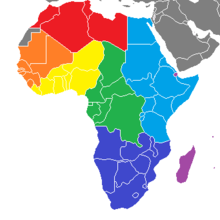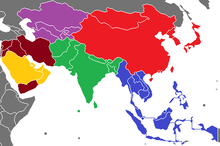This is a list of the women's national basketball teams in the world.
Contents
- Active teams
- FIBA Africa
- FIBA Americas
- FIBA Asia
- FIBA Europe
- FIBA Oceania
- Non-FIBA members
- Defunct teams
- FIBA country codes
- See also
- References

This is a list of the women's national basketball teams in the world.

The International Basketball Federation, or FIBA recognizes 213 national teams divided into 5 zones, each roughly corresponding to a continent (North America and South America are grouped under the Americas.)
The newest national team is Montenegro which was recognized in 2006.
There are more FIBA-recognized teams than FIFA-recognized teams (209).

FIBA Africa, which has 54 national teams, [1] is divided into 7 zones. [2]
Zone 1Zone 2Zone 3 | Zone 4Zone 5 | Zone 6Zone 7 |

FIBA Americas (formerly the Pan-American Basketball Confederation), which controls North America, Central America, the Caribbean, and South America, has 44 national teams, divided into three areas. [3] The Central American and Caribbean Confederations of Basketball (CONCECABA) is further divided into the Central America and Caribbean zone. [4]
CONCECABACaribbean
| Central AmericaNorth AmericaSouth America |

FIBA Asia (formerly the Asian Basketball Confederation) is divided into 5 zones. [5]
East AsiaGulf | Middle Asia | SEABAWABA |
FIBA Europe has 50 member nations under it. [6]
FIBA Oceania has 22 member nations under it. [7]
FIBA uses IOC country codes for most countries which are IOC members. For non-IOC members and exceptions, FIBA uses the following codes:

The Oceania Football Confederation (OFC) is one of the six continental confederations of international association football. The OFC has 13 members, 11 of which are full members and two which are associate members not affiliated with FIFA. It promotes the game in Oceania and allows the member nations to qualify for the FIFA World Cup.
The Centrobasket is a FIBA-sponsored international basketball tournament where national teams from Central America and the Caribbean participate. These countries make up the Central American and Caribbean Basketball Confederation (CONCENCABA). The top three or four Women's National teams typically earn berths to the FIBA Women's AmeriCup, from which they can qualify for the FIBA Basketball World Cup or Summer Olympics. Teams qualify for these tournaments by finishing high in the previous Centrobasket or by placing high at the FIBA COCABA Championship for Mexico and the seven Central American countries and at the FIBA CBC Championship for the 23 Caribbean countries. In total, 31 countries have an opportunity to qualify their national teams for Centrobasket, yet all of them do not enter teams regularly.

The International Baseball Federation (IBAF) is the former worldwide governing body of baseball. It has since been superseded by the World Baseball Softball Confederation (WBSC), and continues to exist as the WBSC's baseball division. Between 1944 and 1975, it was known by its Spanish-language name, as the Federación Internacional de Béisbol Amateur, or FIBA.

The FIBA Basketball World Cup is an international basketball competition between the senior men's national teams of the members of the International Basketball Federation (FIBA), the sport's global governing body. It takes place every four years and is considered the flagship event of FIBA.

The following outline is provided as an overview of and topical guide to sports:

The World Bridge Federation (WBF) is the international governing body of contract bridge. The WBF is responsible for world championship competitions, most of which are conducted at a few multi-event meets on a four-year cycle. The most prestigious championships are those for national teams in Open, Women, and Seniors categories: the Bermuda Bowl, Venice Cup, and Senior Bowl, and the quadrennial World Team Olympiads, incorporated in the World Mind Sports Games beginning 2008.
The International Wheelchair Basketball Federation (IWBF) is the international governing body for the sport of Wheelchair Basketball. IWBF is recognized by the International Paralympic Committee (IPC) as the sole competent authority in wheelchair basketball worldwide. International Basketball Federation has recognized IWBF under Article 53 of its General Statutes.

FIBA Oceania is a zone within FIBA. It is one of FIBA's five continental confederations. FIBA Oceania is responsible for the organization and governance of the major international tournaments in Oceania. It has 22 FIBA Federations and is headquartered in Southport, Gold Coast, Queensland, Australia. The current FIBA Oceania President is David Reid from Australia.

The International Handball Federation (IHF) is the administrative and controlling body for handball and beach handball. IHF is responsible for the organisation of handball's major international tournaments, notably the IHF World Men's Handball Championship, which commenced in 1938, and the IHF World Women's Handball Championship, which commenced in 1957.

The International Basketball Federation is an association of national organizations which governs the sport of basketball worldwide. FIBA defines the rules of basketball, specifies the equipment and facilities required, organizes international competitions, regulates the transfer of athletes across countries, and controls the appointment of international referees. A total of 212 national federations are members, organized since 1989 into five zones: Africa, Americas, Asia, Europe, and Oceania.
Sports in Vanuatu are played throughout the country.

Sport in Oceania varies from country to country. The most popular playing sport for men in Australia is Australian rules football, while for women is netball. Australian rules football is the most popular sport in terms of spectatorship and television ratings. Rugby union is the most popular sport among New Zealanders, while in Papua New Guinea rugby league is the most popular. Cricket is another popular sport throughout the Oceania region.
The 2010–12 Continental Beach Volleyball Cup (CBVC) is the qualification tournament for the beach volleyball tournament at the 2012 Summer Olympics.
The FIBA Basketball World Cup qualification is the process that a national basketball team goes through to qualify for the FIBA Basketball World Cup finals. Qualifiers are held within four FIBA continental zones Africa, Americas, Europe, and Asia-Oceania play in a combined Asia-Pacific region to qualify for the FIBA Basketball World Cup, which are organized by their respective confederations. One extra berth is allocated for the specific continental zone that hosts the event, in addition to the set berths allotted for the region.
The basketball qualification for the Summer Olympics men's basketball tournament occurred from 2014 to 2016; all five FIBA zones sent in teams.
The men's qualification for the Olympic basketball tournament took place from 2019 to 2021; all five FIBA zones were expected to have representation in the Olympic basketball event..